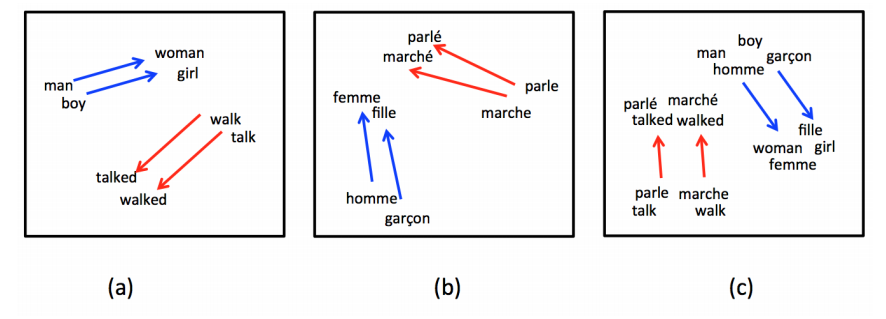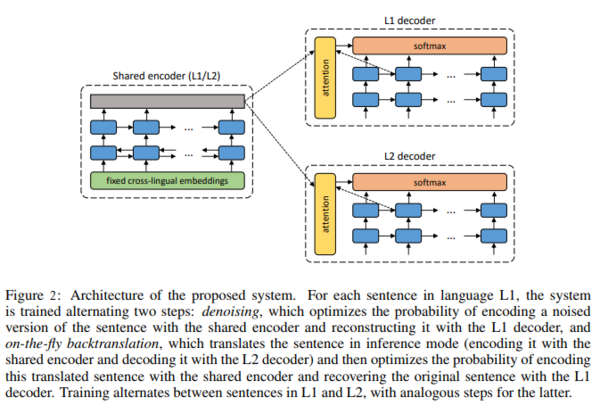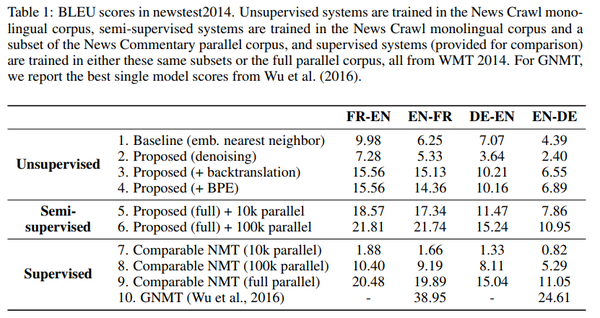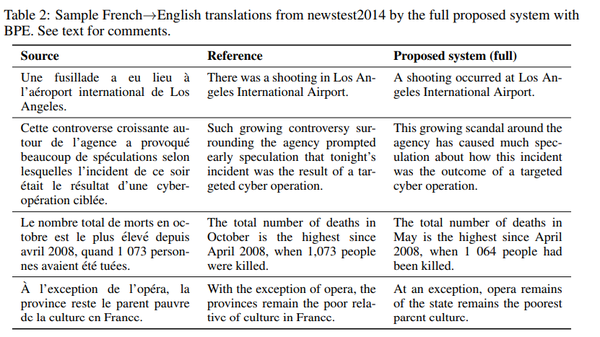Unsupervised Neural Machine Translation
This paper was published in ICLR 2018, authored by Mikel Artetxe, Gorka Labaka, Eneko Agirre, and Kyunghyun Cho. Open source implementation of this paper is available here
Introduction
The paper presents an unsupervised Neural Machine Translation (NMT) method that uses monolingual corpora (single language texts) only. This contrasts with the usual supervised NMT approach which relies on parallel corpora (aligned text) from the source and target languages being available for training. This problem is important because parallel pairing for a majority of languages, e.g. for German-Russian, do not exist.
Other authors have recently tried to address this problem using semi-supervised approaches (small set of parallel corpora). However, these methods still require a strong cross-lingual signal. The proposed method eliminates the need for cross-lingual information all together and relies solely on monolingual data. The proposed method builds upon the work done recently on unsupervised cross-lingual embeddings by Artetxe et al., 2017 and Zhang et al., 2017.
The general approach of the methodology is to:
- Use monolingual corpora in the source and target languages to learn single language word embeddings for both languages separately.
- Align the 2 sets of word embeddings into a single cross lingual (language independent) embedding.
Then iteratively perform:
- Train an encoder-decoder model to reconstruct noisy versions of sentences in both source and target languages separately. The model uses a single encoder and different decoders for each language. The encoder uses cross lingual word embedding.
- Tune the decoder in each language by back-translating between the source and target language.
Background
Word Embedding Alignment
The paper uses word2vec [Mikolov, 2013] to convert each monolingual corpora to vector embeddings. They improve the continuous Skip-gram model for learning high-quality distributed vector representations that capture a large number of precise syntactic and semantic word relationships. These embeddings have been shown to contain the contextual and syntactic features independent of language, and so, in theory, there could exist a linear map that maps the embeddings from language L1 to language L2.
Figure 1 shows an example of aligning the word embeddings in English and French.

Most cross-lingual word embedding methods use bilingual signals in the form of parallel corpora. Usually, the embedding mapping methods train the embeddings in different languages using monolingual corpora, then use a linear transformation to map them into a shared space based on a bilingual dictionary.
The paper uses the methodology proposed by [Artetxe, 2017] to do cross-lingual embedding aligning in an unsupervised manner and without parallel data. Without going into the details, the general approach of this paper is starting from a seed dictionary of numeral pairings (e.g. 1-1, 2-2, etc.), to iteratively learn the mapping between 2 language embeddings, while concurrently improving the dictionary with the learned mapping at each iteration. This is in contrast to earlier work which used dictionaries of a few thousand words.
Statistical Decipherment for Machine Translation
There has been significant work in statistical deciphering techniques (decipherment is the discovery of the meaning of texts written in ancient or obscure languages or scripts) to develop a machine translation model from monolingual data (Ravi & Knight, 2011; Dou & Knight, 2012). These techniques treat the source language as ciphertext (encrypted or encoded information because it contains a form of the original plaintext that is unreadable by a human or computer without the proper cipher for decoding) and model the generation process of the ciphertext as a two-stage process, which includes the generation of the original English sequence and the probabilistic replacement of the words in it. This approach takes advantage of the incorporation of syntactic knowledge of the languages. The use of word embeddings has also shown improvements in statistical decipherment.
Low-Resource Neural Machine Translation
There are also proposals that use techniques other than direct parallel corpora to do NMT. Some use a third intermediate language that is well connected to the source and target languages independently. For example, if we want to translate German into Russian, we can use English as an intermediate language (German-English and then English-Russian) since there are plenty of resources to connect English and other languages. Johnson et al. (2017) show that a multilingual extension of a standard NMT architecture performs reasonably well for language pairs when no parallel data for the source and target data was used during training. Firat et al. (2016) and Chen et al. (2017) showed that the use of advanced models like teacher-student framework can be used to improve over the baseline of translating using a third intermediate language.
Other works use monolingual data in combination with scarce parallel corpora. A simple but effective technique is back-translation [Sennrich et al, 2016]. First, a synthetic parallel corpus in the target language is created. Translated sentence and back translated to the source language and compared with the original sentence.
The most important contribution to the problem of training an NMT model with monolingual data was from [He, 2016], which trains two agents to translate in opposite directions (e.g. French → English and English → French) and teach each other through reinforcement learning. However, this approach still required a large parallel corpus for a warm start (about 1.2 million sentences), while this paper does not use parallel data.
Methodology
The corpora data is first preprocessed in a standard way to tokenize and case the words. The authors also experimented with an alternative way of tokenizing words by using Byte-Pair Encoding (BPE) [Sennrich, 2016](Byte pair encoding or digram coding is a simple form of data compression in which the most common pair of consecutive bytes of data is replaced with a byte that does not occur within that data). BPE has been shown to improve embeddings of rare-words. The vocabulary was limited to the most frequent 50,000 tokens (BPE tokens or words).
The tokens were then converted to word embeddings using word2vec with 300 dimensions and then aligned between languages using the method proposed by [Artetxe, 2017]. The alignment method proposed by [Artetxe, 2017] is also used as a baseline to evaluate this model as discussed later in Results.
The translation model uses a standard encoder-decoder model with attention. The encoder is a 2-layer bidirectional RNN, and the decoder is a 2 layer RNN. All RNNs use GRU cells with 600 hidden units. The encoder is shared by the source and target language, while the decoder is different for each language.
Although the architecture uses standard models, the proposed system differs from the standard NMT through 3 aspects:
- Dual structure: NMT usually are built for one direction translations English[math]\displaystyle{ \rightarrow }[/math]French or French[math]\displaystyle{ \rightarrow }[/math]English, whereas the proposed model trains both directions at the same time translating English[math]\displaystyle{ \leftrightarrow }[/math]French.
- Shared encoder: one encoder is shared for both source and target languages in order to produce a representation in the latent space independent of language, and each decoder learns to transform the representation back to its corresponding language.
- Fixed embeddings in the encoder: Most NMT systems initialize the embeddings and update them during training, whereas the proposed system trains the embeddings in the beginning and keeps these fixed throughout training, so the encoder receives language-independent representations of the words. This approach ensures that the encoder only learns how to compose the language independent representations to build representations of the larger phrases. This requires existing unsupervised methods to create embeddings using monolingual corpora as discussed in the background. In the proposed method, even though the embeddings used are cross-lingual, the vocabulary used for each language is language is different. This way a word which occurs in two different languages but has a different meaning in those languages would get a different vector in each of these languages despite being in the same vector space.

The translation model iteratively improves the encoder and decoder by performing 2 tasks: Denoising, and Back-translation.
Denoising
Random noise is added to the input sentences in order to allow the model to learn some structure of languages. Without noise, the model would simply learn to copy the input word by word. Noise also allows the shared encoder to compose the embeddings of both languages in a language-independent fashion, and then be decoded by the language dependent decoder.
Denoising works by reconstructing a noisy version of a sentence back into the original sentence in the same language. In mathematical form, if [math]\displaystyle{ x }[/math] is a sentence in language L1:
- Construct [math]\displaystyle{ C(x) }[/math], noisy version of [math]\displaystyle{ x }[/math]. In the proposed model, [math]\displaystyle{ C(x) }[/math] is constructed by randomly swapping contiguous words. If the length of the input sequence [math]\displaystyle{ x }[/math] is [math]\displaystyle{ N }[/math], then a total of [math]\displaystyle{ \frac{N}{2} }[/math] such swaps are made.
- Input [math]\displaystyle{ C(x) }[/math] into the current iteration of the shared encoder and use decoder for L1 to get reconstructed [math]\displaystyle{ \hat{x} }[/math].
The training objective is to minimize the cross entropy loss between [math]\displaystyle{ {x} }[/math] and [math]\displaystyle{ \hat{x} }[/math].
In other words, the whole system is optimized to take an input sentence in a given language, encode it using the shared encoder, and reconstruct the original sentence using the decoder of that language.
The proposed noise function is to perform [math]\displaystyle{ N/2 }[/math] random swaps of words that are contiguous, where [math]\displaystyle{ N }[/math] is the number of words in the sentence. This noise model also helps reduce the reliance of the model on the order of words in a sentence which may be different in the source and target languages. The system will also need to correctly learn the of a language to decode the sentence into the correct order.
Back-Translation
With only denoising, the system doesn't have a goal to improve the actual translation. Back-translation works by using the decoder of the target language to create a translation, then encoding this translation and decoding again using the source decoder to reconstruct a the original sentence. In mathematical form, if [math]\displaystyle{ C(x) }[/math] is a noisy version of sentence [math]\displaystyle{ x }[/math] in language L1:
- Input [math]\displaystyle{ C(x) }[/math] into the current iteration of shared encoder and the decoder in L2 to construct translation [math]\displaystyle{ y }[/math] in L2,
- Construct [math]\displaystyle{ C(y) }[/math], noisy version of translation [math]\displaystyle{ y }[/math],
- Input [math]\displaystyle{ C(y) }[/math] into the current iteration of shared encoder and the decoder in L1 to reconstruct [math]\displaystyle{ \hat{x} }[/math] in L1.
The training objective is to minimize the cross entropy loss between [math]\displaystyle{ {x} }[/math] and [math]\displaystyle{ \hat{x} }[/math].
Contrary to standard back-translation that uses an independent model to back-translate the entire corpus at one time, the system uses mini-batches and the dual architecture to generate pseudo-translations and then train the model with the translation, improving the model iteratively as the training progresses.
Training
Training is done by alternating these 2 objectives from mini-batch to mini-batch. Each iteration would perform one mini-batch of denoising for L1, another one for L2, one mini-batch of back-translation from L1 to L2, and another one from L2 to L1. The procedure is repeated until convergence. During decoding, greedy decoding was used at training time for back-translation, but actual inference at test time was done using beam-search with a beam size of 12.
Optimizer choice and other hyperparameters can be found in the paper.
Experiments and Results
The model was evaluated using the Bilingual Evaluation Understudy (BLEU) Score, which is typically used to evaluate the quality of the translation, using a reference (ground-truth) translation.
The paper trained translation model under 3 different settings to compare the performance (Table 1). All training and testing data used was from a standard NMT dataset, WMT'14.

The results show that backtranslation is essential for the proposed system to work properly. The denoising technique alone is below the baseline while big improvements appear when introducing backtranslation.
Unsupervised
The model only has access to monolingual corpora, using the News Crawl corpus with articles from 2007 to 2013. The baseline for unsupervised is the method proposed by [Artetxe, 2017], which was the unsupervised word vector alignment method discussed in the Background section.
The paper adds each component piece-wise when doing an evaluation to test the impact each piece has on the final score. As shown in Table 1, Unsupervised results compared to the baseline of word-by-word results are strong, with improvement between 40% to 140%. Results also show that back-translation is essential. Denoising doesn't show a big improvement however it is required for back-translation, because otherwise, back-translation would translate nonsensical sentences. The addition of backtranslation, however, does show large improvement on all tested cases.
For the BPE experiment, results show it helps in some language pairs but detract in some other language pairs. This is because while BPE helped to translate some rare words, it increased the error rates in other words. It also did not perform well when translating named entities which occur infrequently.
Semi-supervised
Since there is often some small parallel data but not enough to train a Neural Machine Translation system, the authors test a semi-supervised setting with the same monolingual data from the unsupervised settings together with either 10,000 or 100,000 random sentence pairs from the News Commentary parallel corpus. The supervision is included to improve the model during the back-translation stage to directly predict sentences that are in the parallel corpus.
Table 1 shows that the model can greatly benefit from the addition of a small parallel corpus to the monolingual corpora. It is surprising that semi-supervised in row 6 outperforms supervised in row 7, one possible explanation is that both the semi-supervised training set and the test set belong to the news domain, whereas the supervised training set is all domains of corpora.
Supervised
This setting provides an upper bound to the unsupervised proposed system. The data used was the combination of all parallel corpora provided at WMT 2014, which includes Europarl, Common Crawl and News Commentary for both language pairs plus the UN and the Gigaword corpus for French- English. Moreover, the authors use the same subsets of News Commentary alone to run the separate experiments in order to compare with the semi-supervised scenario.
The Comparable NMT was trained using the same proposed model except it does not use monolingual corpora, and consequently, it was trained without denoising and back-translation. The proposed model under a supervised setting does much worse than the state of the NMT in row 10, which suggests that adding the additional constraints to enable unsupervised learning also limits the potential performance. To improve these results, the authors also suggest using larger models, longer training times, and incorporating several well-known NMT techniques.
Qualitative Analysis

Table 2 shows 4 examples of French to English translations, which shows that the high-quality translations are produced by the proposed system, and this system adequately models non-trivial translation relations. Example 1 and 2 show that the model is able to not only go beyond a literal word-by-word substitution but also model structural differences in the languages (ex.e, it correctly translates "l’aeroport international de Los Angeles" as "Los Angeles International Airport", and it is capable of producing high-quality translations of long and more complex sentences. However, in Example 3 and 4, the system failed to translate the months and numbers correctly and having difficulty with comprehending odd sentence structures, which means that the proposed system has limitations. Specially, the authors points that the proposed model has difficulties to preserve some concrete details from source sentences. Results also show, the proposed model's translation quality often lags behind that of a standard supervised NMT system and also there are also some cases where there are both fluency and adequacy problems that severely hinders understanding the original message from the proposed translation, suggesting that there is still room for improvement and possible future work.
Conclusions and Future Work
The paper presented an unsupervised model to perform translations with monolingual corpora by using an attention-based encoder-decoder system and training using denoise and back-translation.
Although experimental results show that the proposed model is effective as an unsupervised approach, there is significant room for improvement when using the model in a supervised way, suggesting the model is limited by the architectural modifications. Some ideas for future improvement include:
- Instead of using fixed cross-lingual word embeddings at the beginning which forces the encoder to learn a common representation for both languages, progressively update the weight of the embeddings as training progresses.
- Decouple the shared encoder into 2 independent encoders at some point during training
- Progressively reduce the noise level
- Incorporate character level information into the model, which might help address some of the adequacy issues observed in our manual analysis
- Use other noise/denoising techniques, and analyze their effect in relation to the typological divergences of different language pairs.
Critique
While the idea is interesting and the results are impressive for an unsupervised approach, much of the model had actually already been proposed by other papers that are referenced. The paper doesn't add a lot of new ideas but only builds on existing techniques and combines them in a different way to achieve good experimental results. The paper is not a significant algorithmic contribution.
As pointed out, in order to critically analyze the effect of the algorithm, we need to formulate the algorithm in terms of mathematics.
The results showed that the proposed system performed far worse than the state of the art when used in a supervised setting, which is concerning and shows that the techniques used creates a limitation and a ceiling for performance.
Additionally, there was no rigorous hyperparameter exploration/optimization for the model. As a result, it is difficult to conclude whether the performance limit observed in the constrained supervised model is the absolute limit, or whether this could be overcome in both supervised/unsupervised models with the right constraints to achieve more competitive results.
The best results shown are between two very closely related languages(English and French), and does much worse for English - German, even though English and German are also closely related (but less so than English and French) which suggests that the model may not be successful at translating between distant language pairs. More testing would be interesting to see.
The results comparison could have shown how the semi-supervised version of the model scores compared to other semi-supervised approaches as touched on in the other works section.
Their qualitative analysis just checks whether their proposed unsupervised NMT generates a sensible translation. It is limited and it needs further detailed analysis regarding the characteristics and properties of translation which is generated by unsupervised NMT.
- (As pointed out by an anonymous reviewer [1])Future work is vague: “we would like to detect and mitigate the specific causes…” “We also think that a better handling of rare words…” That’s great, but how will you do these things? Do you have specific reasons to think this, or ideas on how to approach them? Otherwise, this is just hand-waving.
References
- [Mikolov, 2013] Tomas Mikolov, Ilya Sutskever, Kai Chen, Greg S Corrado, and Jeff Dean. "Distributed representations of words and phrases and their compositionality."
- [Artetxe, 2017] Mikel Artetxe, Gorka Labaka, Eneko Agirre, "Learning bilingual word embeddings with (almost) no bilingual data".
- [Gouws,2016] Stephan Gouws, Yoshua Bengio, Greg Corrado, "BilBOWA: Fast Bilingual Distributed Representations without Word Alignments."
- [He, 2016] Di He, Yingce Xia, Tao Qin, Liwei Wang, Nenghai Yu, Tieyan Liu, and Wei-Ying Ma. "Dual learning for machine translation."
- [Sennrich,2016] Rico Sennrich and Barry Haddow and Alexandra Birch, "Neural Machine Translation of Rare Words with Subword Units."
- [Ravi & Knight, 2011] Sujith Ravi and Kevin Knight, "Deciphering foreign language."
- [Dou & Knight, 2012] Qing Dou and Kevin Knight, "Large scale decipherment for out-of-domain machine translation."
- [Johnson et al. 2017] Melvin Johnson,et al, "Google’s multilingual neural machine translation system: Enabling zero-shot translation."
- [Zhang et al. 2017] Meng Zhang, Yang Liu, Huanbo Luan, and Maosong Sun. "Adversarial training for unsupervised bilingual lexicon induction"